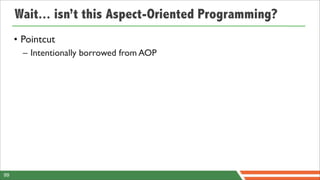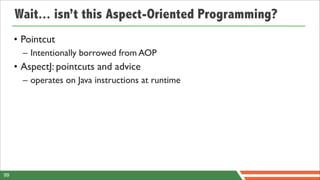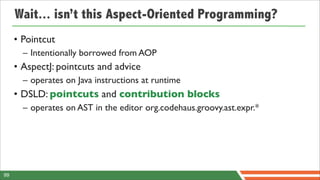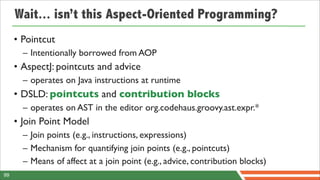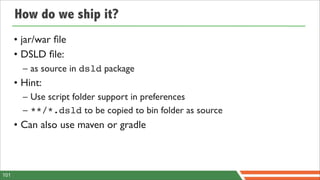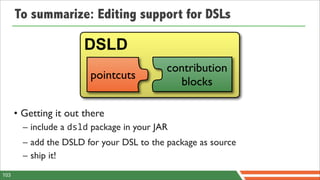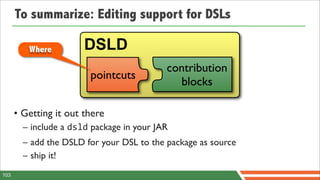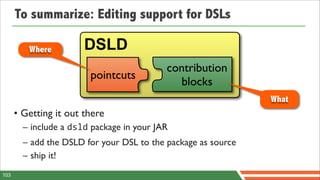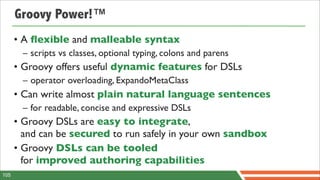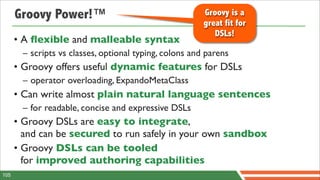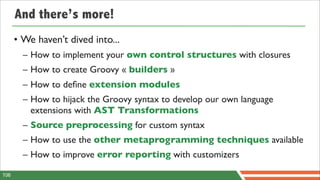The document discusses Groovy domain-specific languages (DSLs), which are tailored programming languages designed to address specific problem domains while contrasting them with general-purpose languages. It highlights the benefits of using DSLs, such as improved expressiveness and the ability to involve domain experts in application design, alongside potential drawbacks like learning costs and limited applicability. Additionally, it covers Groovy’s capabilities for building DSLs, emphasizing its flexible syntax and integration with Java applications.
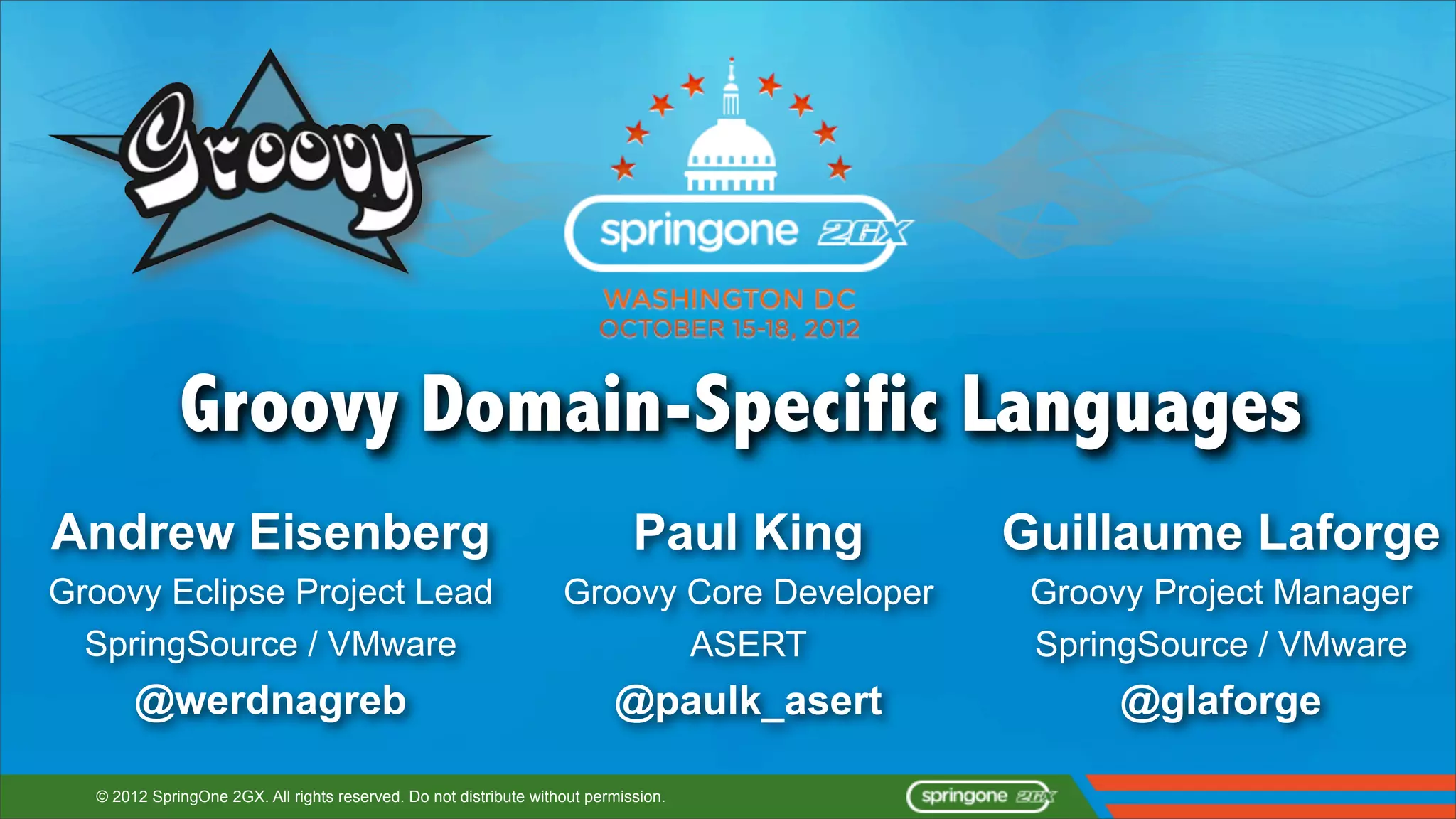




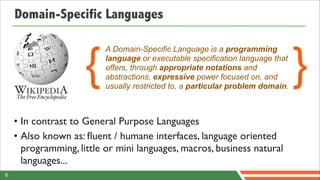
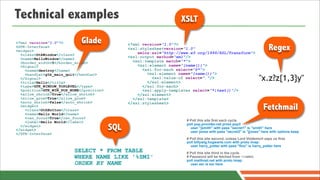

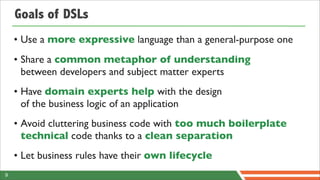
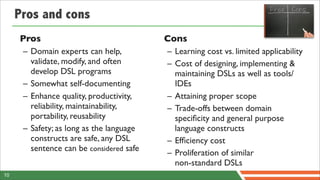
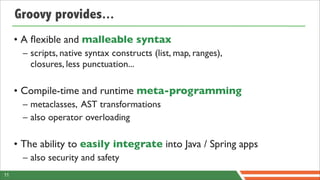





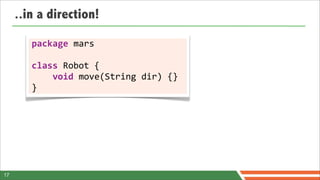
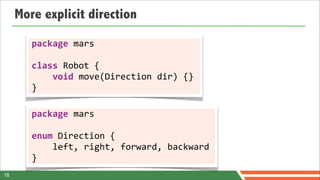
![Now how can we control it?
import
static
mars.Direction.*;
import
mars.Robot;
public
class
Command
{
public
static
void
main(String[]
args)
{
Robot
robot
=
new
Robot();
robot.move(left);
}
}
19](https://image.slidesharecdn.com/groovydsls-springone2gx2012-121016222638-phpapp02/85/Groovy-Domain-Specific-Languages-SpringOne2GX-2012-19-320.jpg)
![Now how can we control it?
import
static
mars.Direction.*;
import
mars.Robot;
public
class
Command
{
public
static
void
main(String[]
args)
{
Robot
robot
=
new
Robot();
robot.move(left);
}
} Syntactical
noise!
19](https://image.slidesharecdn.com/groovydsls-springone2gx2012-121016222638-phpapp02/85/Groovy-Domain-Specific-Languages-SpringOne2GX-2012-20-320.jpg)
![Now how can we control it?
—
import
static
mars.Direction.*;
—
import
mars.Robot;
——————————————————————
public
class
Command
{
————————————————————————————————————————
public
static
void
main(String[]
args)
{
—————
—
Robot
robot
=
new
Robot();
—
——
robot.move(left);
—
}
—
} Syntactical
noise!
19](https://image.slidesharecdn.com/groovydsls-springone2gx2012-121016222638-phpapp02/85/Groovy-Domain-Specific-Languages-SpringOne2GX-2012-21-320.jpg)
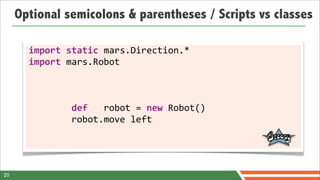
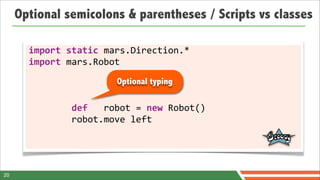
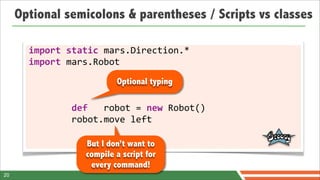


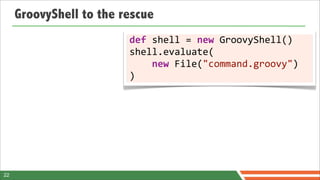
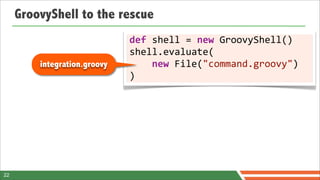
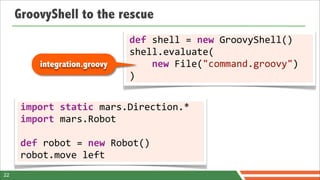
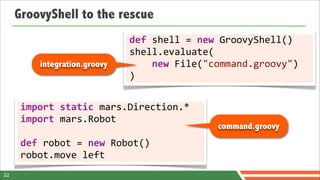
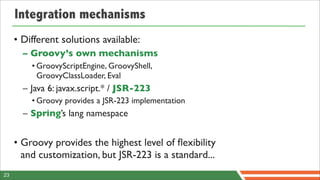
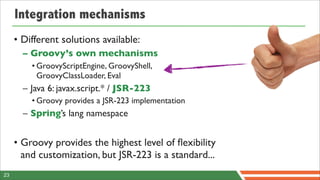
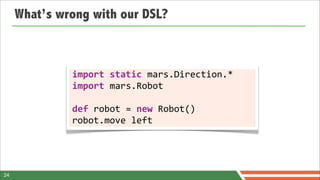
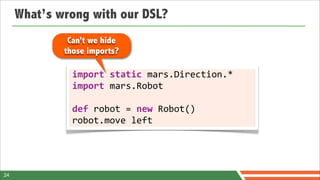
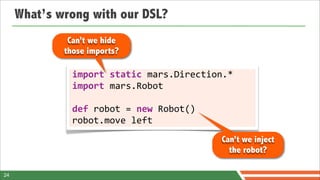
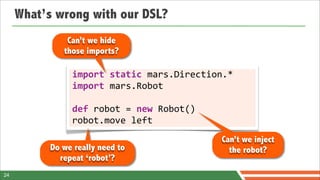



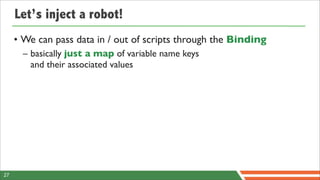
![Let’s inject a robot!
• We can pass data in / out of scripts through the Binding
– basically just a map of variable name keys
and their associated values
def
binding
=
new
Binding([
robot:
new
mars.Robot()
])
def
shell
=
new
GroovyShell(binding)
shell.evaluate(
new
File("command.groovy")
)
27](https://image.slidesharecdn.com/groovydsls-springone2gx2012-121016222638-phpapp02/85/Groovy-Domain-Specific-Languages-SpringOne2GX-2012-41-320.jpg)
![Let’s inject a robot!
• We can pass data in / out of scripts through the Binding
– basically just a map of variable name keys
and their associated values
integration.groovy
def
binding
=
new
Binding([
robot:
new
mars.Robot()
])
def
shell
=
new
GroovyShell(binding)
shell.evaluate(
new
File("command.groovy")
)
27](https://image.slidesharecdn.com/groovydsls-springone2gx2012-121016222638-phpapp02/85/Groovy-Domain-Specific-Languages-SpringOne2GX-2012-42-320.jpg)
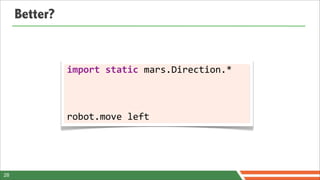
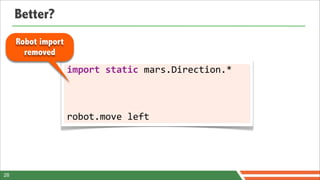
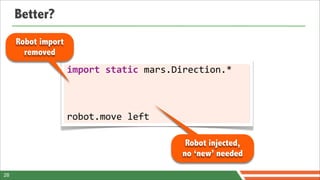
![How to inject the direction?
• Using the import
mars.*
binding...
def
binding
=
new
Binding([
robot:
new
Robot(),
left:
Direction.left,
right:
Direction.right,
backward:
Direction.backward,
forward:
Direction.forward
])
def
shell
=
new
GroovyShell(binding)
shell.evaluate(
new
File("command.groovy")
)
29](https://image.slidesharecdn.com/groovydsls-springone2gx2012-121016222638-phpapp02/85/Groovy-Domain-Specific-Languages-SpringOne2GX-2012-46-320.jpg)
![How to inject the direction?
• Using the import
mars.* Fragile in case of
new directions!
binding...
def
binding
=
new
Binding([
robot:
new
Robot(),
left:
Direction.left,
right:
Direction.right,
backward:
Direction.backward,
forward:
Direction.forward
])
def
shell
=
new
GroovyShell(binding)
shell.evaluate(
new
File("command.groovy")
)
29](https://image.slidesharecdn.com/groovydsls-springone2gx2012-121016222638-phpapp02/85/Groovy-Domain-Specific-Languages-SpringOne2GX-2012-47-320.jpg)
![How to inject the direction?
• Using the import
mars.*
binding...
def
binding
=
new
Binding([
robot:
new
Robot(),
*:
Direction.values()
.collectEntries
{
Spread map
[(it.name()):
it]
operator
}
])
def
shell
=
new
GroovyShell(binding)
shell.evaluate(
new
File("command.groovy")
)
30](https://image.slidesharecdn.com/groovydsls-springone2gx2012-121016222638-phpapp02/85/Groovy-Domain-Specific-Languages-SpringOne2GX-2012-48-320.jpg)
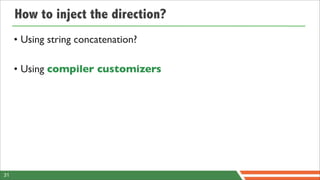
![String concatenation? Bad idea!
new
GroovyShell(new
Binding([robot:
new
mars.Robot()]))
.evaluate("import
static
mars.Direction.*n"
+
"robot.move
left")
32](https://image.slidesharecdn.com/groovydsls-springone2gx2012-121016222638-phpapp02/85/Groovy-Domain-Specific-Languages-SpringOne2GX-2012-50-320.jpg)
![String concatenation? Bad idea!
Cheat with string
concatenation? Bad!
new
GroovyShell(new
Binding([robot:
new
mars.Robot()]))
.evaluate("import
static
mars.Direction.*n"
+
"robot.move
left")
32](https://image.slidesharecdn.com/groovydsls-springone2gx2012-121016222638-phpapp02/85/Groovy-Domain-Specific-Languages-SpringOne2GX-2012-51-320.jpg)
![String concatenation? Bad idea!
new
GroovyShell(new
Binding([robot:
new
mars.Robot()]))
.evaluate("import
static
mars.Direction.*n"
+
"robot.move
left")
32](https://image.slidesharecdn.com/groovydsls-springone2gx2012-121016222638-phpapp02/85/Groovy-Domain-Specific-Languages-SpringOne2GX-2012-52-320.jpg)
![String concatenation? Bad idea!
Line #1
becomes
Line #2
new
GroovyShell(new
Binding([robot:
new
mars.Robot()]))
.evaluate("import
static
mars.Direction.*n"
+
"robot.move
left")
32](https://image.slidesharecdn.com/groovydsls-springone2gx2012-121016222638-phpapp02/85/Groovy-Domain-Specific-Languages-SpringOne2GX-2012-53-320.jpg)
![String concatenation? Bad idea!
new
GroovyShell(new
Binding([robot:
new
mars.Robot()]))
.evaluate("import
static
mars.Direction.*n"
+
"robot.move
left")
32](https://image.slidesharecdn.com/groovydsls-springone2gx2012-121016222638-phpapp02/85/Groovy-Domain-Specific-Languages-SpringOne2GX-2012-54-320.jpg)
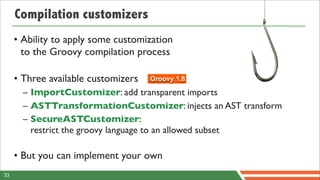
![Imports customizer
def
configuration
=
new
CompilerConfiguration()
def
imports
=
new
ImportCustomizer()
imports.addStaticStar(mars.Direction.name)
configuration.addCompilationCustomizers(imports)
new
GroovyShell(new
Binding([robot:
new
mars.Robot()]),
configuration)
.evaluate("robot.move
left")
34](https://image.slidesharecdn.com/groovydsls-springone2gx2012-121016222638-phpapp02/85/Groovy-Domain-Specific-Languages-SpringOne2GX-2012-56-320.jpg)
![AST transformation customizer
def
configuration
=
new
CompilerConfiguration()
def
imports
=
new
ImportCustomizer()
imports.addStaticStar(mars.Direction.name)
configuration.addCompilationCustomizers(imports,
new
ASTTransformationCustomizer(Log))
new
GroovyShell(new
Binding([robot:
new
mars.Robot()]),
configuration)
.evaluate("robot.move
left"
+
"n"
"log.info
‘Robot
moved’")
35](https://image.slidesharecdn.com/groovydsls-springone2gx2012-121016222638-phpapp02/85/Groovy-Domain-Specific-Languages-SpringOne2GX-2012-57-320.jpg)
![AST transformation customizer
def
configuration
=
new
CompilerConfiguration()
def
imports
=
new
ImportCustomizer()
imports.addStaticStar(mars.Direction.name)
configuration.addCompilationCustomizers(imports,
new
ASTTransformationCustomizer(Log))
new
GroovyShell(new
Binding([robot:
new
mars.Robot()]),
configuration)
.evaluate("robot.move
left"
+
"n"
"log.info
‘Robot
moved’")
@Log injects a logger in
scripts and classes
35](https://image.slidesharecdn.com/groovydsls-springone2gx2012-121016222638-phpapp02/85/Groovy-Domain-Specific-Languages-SpringOne2GX-2012-58-320.jpg)

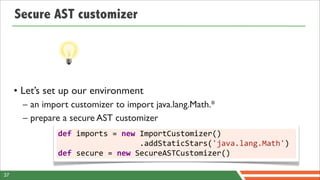
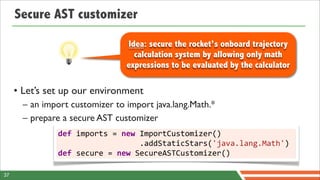
![Secure AST customizer
...
secure.with
{
//
disallow
closure
creation
closuresAllowed
=
false
//
disallow
method
definitions
methodDefinitionAllowed
=
false
//
empty
white
list
=>
forbid
imports
importsWhitelist
=
[]
staticImportsWhitelist
=
[]
//
only
allow
the
java.lang.Math.*
static
import
staticStarImportsWhitelist
=
['java.lang.Math']
...
38](https://image.slidesharecdn.com/groovydsls-springone2gx2012-121016222638-phpapp02/85/Groovy-Domain-Specific-Languages-SpringOne2GX-2012-62-320.jpg)
![Secure AST customizer
Disallow closures
... and methods
secure.with
{
//
disallow
closure
creation
closuresAllowed
=
false
//
disallow
method
definitions
methodDefinitionAllowed
=
false
//
empty
white
list
=>
forbid
imports
importsWhitelist
=
[]
staticImportsWhitelist
=
[]
//
only
allow
the
java.lang.Math.*
static
import
staticStarImportsWhitelist
=
['java.lang.Math']
...
38](https://image.slidesharecdn.com/groovydsls-springone2gx2012-121016222638-phpapp02/85/Groovy-Domain-Specific-Languages-SpringOne2GX-2012-63-320.jpg)
![Secure AST customizer
Disallow closures
... and methods
secure.with
{
//
disallow
closure
creation
closuresAllowed
=
false
//
disallow
method
definitions Black / white list
methodDefinitionAllowed
=
false
imports
//
empty
white
list
=>
forbid
imports
importsWhitelist
=
[]
staticImportsWhitelist
=
[]
//
only
allow
the
java.lang.Math.*
static
import
staticStarImportsWhitelist
=
['java.lang.Math']
...
38](https://image.slidesharecdn.com/groovydsls-springone2gx2012-121016222638-phpapp02/85/Groovy-Domain-Specific-Languages-SpringOne2GX-2012-64-320.jpg)
![Secure AST customizer
...
//
language
tokens
allowed
tokensWhitelist
=
[
PLUS,
MINUS,
MULTIPLY,
DIVIDE,
MOD,
POWER,
PLUS_PLUS,
MINUS_MINUS,
COMPARE_EQUAL,
COMPARE_NOT_EQUAL,
COMPARE_LESS_THAN,
COMPARE_LESS_THAN_EQUAL,
COMPARE_GREATER_THAN,
COMPARE_GREATER_THAN_EQUAL
]
//
types
allowed
to
be
used
(including
primitive
types)
constantTypesClassesWhiteList
=
[
Integer,
Float,
Long,
Double,
BigDecimal,
Integer.TYPE,
Long.TYPE,
Float.TYPE,
Double.TYPE
]
//
classes
who
are
allowed
to
be
receivers
of
method
calls
receiversClassesWhiteList
=
[
Math,
Integer,
Float,
Double,
Long,
BigDecimal
]
}
...
39](https://image.slidesharecdn.com/groovydsls-springone2gx2012-121016222638-phpapp02/85/Groovy-Domain-Specific-Languages-SpringOne2GX-2012-65-320.jpg)
![Secure AST customizer You can build a subset of
the Groovy syntax!
...
//
language
tokens
allowed
tokensWhitelist
=
[
PLUS,
MINUS,
MULTIPLY,
DIVIDE,
MOD,
POWER,
PLUS_PLUS,
MINUS_MINUS,
COMPARE_EQUAL,
COMPARE_NOT_EQUAL,
COMPARE_LESS_THAN,
COMPARE_LESS_THAN_EQUAL,
COMPARE_GREATER_THAN,
COMPARE_GREATER_THAN_EQUAL
]
//
types
allowed
to
be
used
(including
primitive
types)
constantTypesClassesWhiteList
=
[
Integer,
Float,
Long,
Double,
BigDecimal,
Integer.TYPE,
Long.TYPE,
Float.TYPE,
Double.TYPE
]
//
classes
who
are
allowed
to
be
receivers
of
method
calls
receiversClassesWhiteList
=
[
Math,
Integer,
Float,
Double,
Long,
BigDecimal
]
}
...
39](https://image.slidesharecdn.com/groovydsls-springone2gx2012-121016222638-phpapp02/85/Groovy-Domain-Specific-Languages-SpringOne2GX-2012-66-320.jpg)
![Secure AST customizer You can build a subset of
the Groovy syntax!
...
//
language
tokens
allowed
tokensWhitelist
=
[
PLUS,
MINUS,
MULTIPLY,
DIVIDE,
MOD,
POWER,
PLUS_PLUS,
MINUS_MINUS,
COMPARE_EQUAL,
COMPARE_NOT_EQUAL,
COMPARE_LESS_THAN,
COMPARE_LESS_THAN_EQUAL,
COMPARE_GREATER_THAN,
COMPARE_GREATER_THAN_EQUAL
]
//
types
allowed
to
be
used
(including
primitive
types)
constantTypesClassesWhiteList
=
[ Black / white list
Integer,
Float,
Long,
Double,
BigDecimal,
Integer.TYPE,
Long.TYPE,
Float.TYPE,
Double.TYPE
usage of classes
]
//
classes
who
are
allowed
to
be
receivers
of
method
calls
receiversClassesWhiteList
=
[
Math,
Integer,
Float,
Double,
Long,
BigDecimal
]
}
...
39](https://image.slidesharecdn.com/groovydsls-springone2gx2012-121016222638-phpapp02/85/Groovy-Domain-Specific-Languages-SpringOne2GX-2012-67-320.jpg)
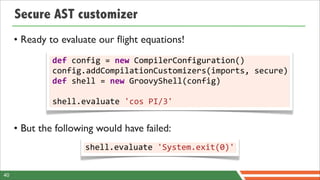
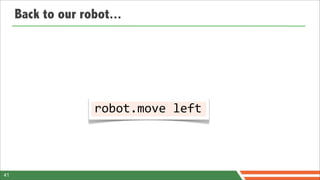



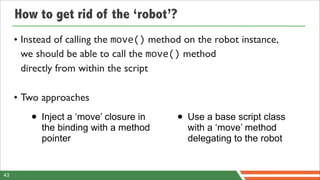
![Inject a closure in the binding
def
robot
=
new
mars.Robot()
binding
=
new
Binding([
robot:
robot,
*:
Direction.values()
.collectEntries
{
[(it.name()):
it]
},
move:
robot.&move
])
44](https://image.slidesharecdn.com/groovydsls-springone2gx2012-121016222638-phpapp02/85/Groovy-Domain-Specific-Languages-SpringOne2GX-2012-74-320.jpg)
![Inject a closure in the binding
def
robot
=
new
mars.Robot()
binding
=
new
Binding([
robot:
robot,
*:
Direction.values()
.collectEntries
{
[(it.name()):
it]
},
Method pointer
move:
robot.&move (a closure) on
]) robot’s move
instance method
44](https://image.slidesharecdn.com/groovydsls-springone2gx2012-121016222638-phpapp02/85/Groovy-Domain-Specific-Languages-SpringOne2GX-2012-75-320.jpg)
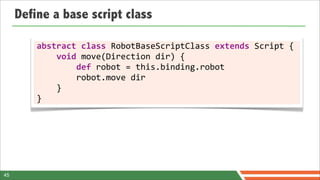
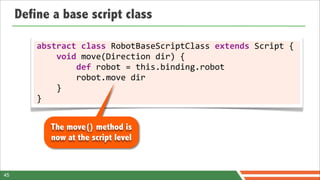
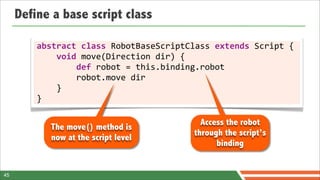
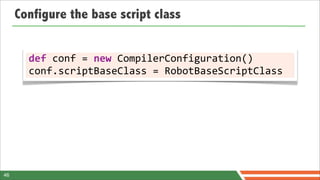
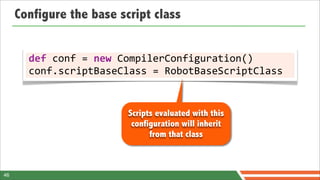



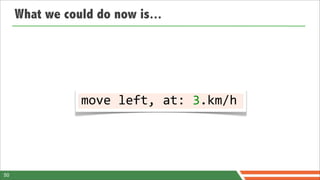
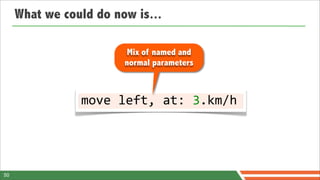
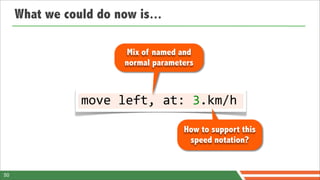
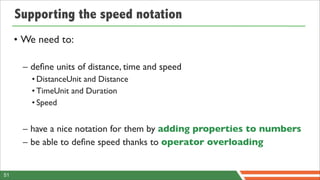
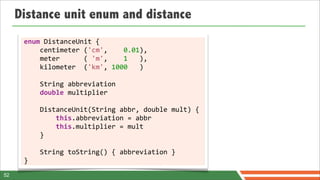
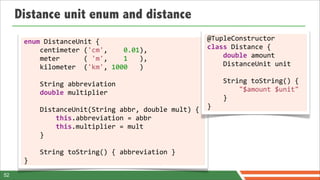
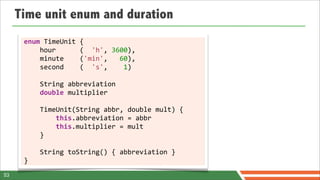
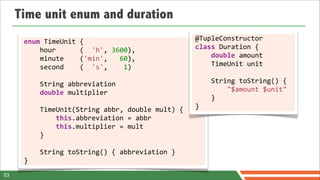
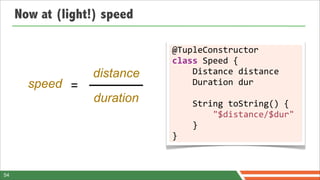
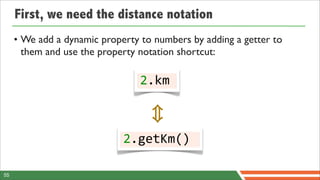

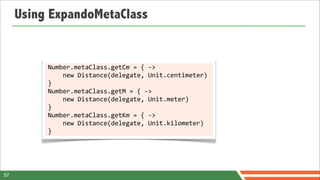
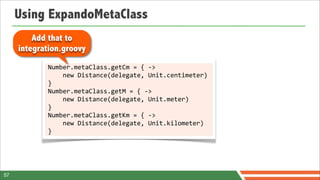
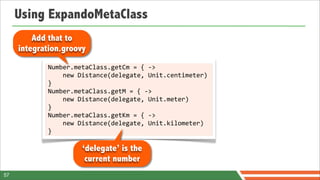
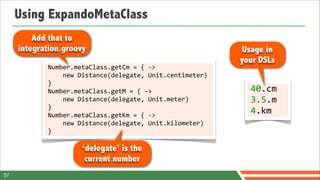
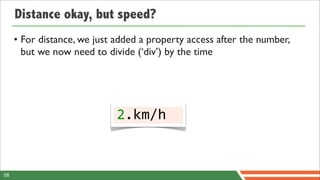
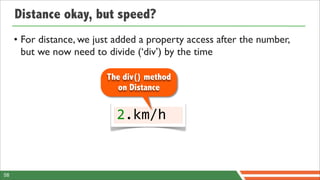
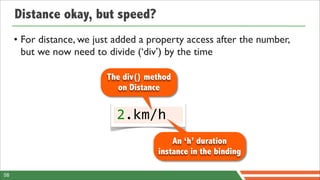
![Inject the ‘h’ hour constant in the binding
def
binding
=
new
Binding([
robot:
new
Robot(),
*:
Direction.values()
.collectEntries
{
[(it.name()):
it]
},
h:
new
Duration(1,
TimeUnit.hour)
])
59](https://image.slidesharecdn.com/groovydsls-springone2gx2012-121016222638-phpapp02/85/Groovy-Domain-Specific-Languages-SpringOne2GX-2012-102-320.jpg)
![Inject the ‘h’ hour constant in the binding
def
binding
=
new
Binding([
robot:
new
Robot(),
*:
Direction.values()
.collectEntries
{
An ‘h’ duration added
[(it.name()):
it]
to the binding
},
h:
new
Duration(1,
TimeUnit.hour)
])
59](https://image.slidesharecdn.com/groovydsls-springone2gx2012-121016222638-phpapp02/85/Groovy-Domain-Specific-Languages-SpringOne2GX-2012-103-320.jpg)
![Operator overloading
a
+
b
//
a.plus(b)
a
-‐
b
//
a.minus(b) • Currency amounts
a
*
b
//
a.multiply(b) – 15.euros + 10.dollars
a
/
b
//
a.div(b)
a
%
b
//
a.modulo(b) • Distance handling
a
**
b
//
a.power(b)
a
|
b
//
a.or(b)
– 10.km - 10.m
a
&
b
//
a.and(b)
a
^
b
//
a.xor(b) • Workflow, concurrency
a[b]
//
a.getAt(b) – taskA | taskB & taskC
a
<<
b
//
a.leftShift(b)
a
>>
b
//
a.rightShift(b) • Credit an account
a
>>>
b
//
a.rightShiftUnsigned(b) – account << 10.dollars
+a
//
a.unaryPlus() account += 10.dollars
-‐a
//
a.unaryMinus() account.credit 10.dollars
~a
//
a.bitwiseNegate()
60](https://image.slidesharecdn.com/groovydsls-springone2gx2012-121016222638-phpapp02/85/Groovy-Domain-Specific-Languages-SpringOne2GX-2012-104-320.jpg)
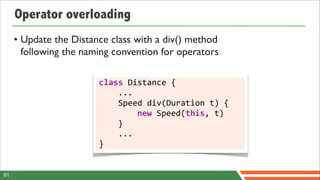
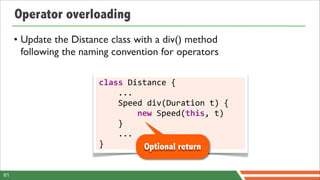
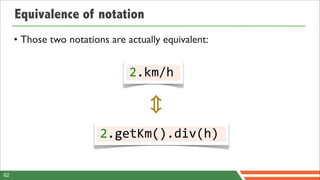
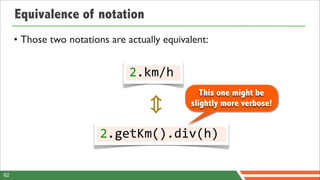
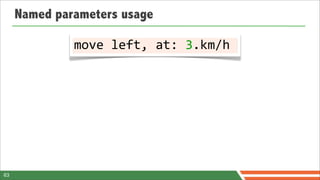
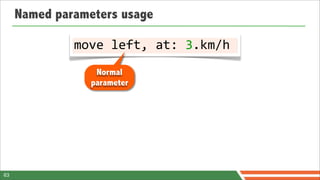
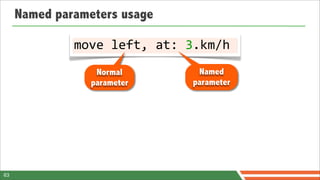
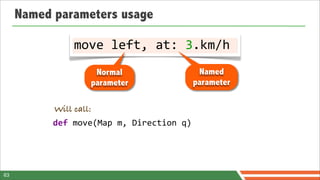
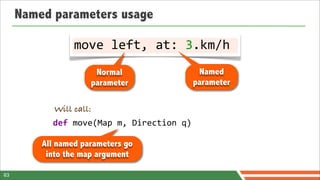
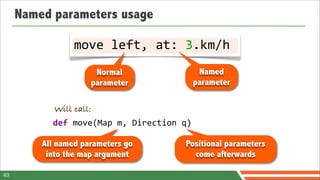
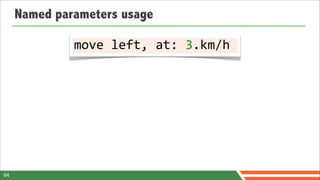
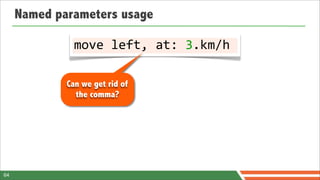
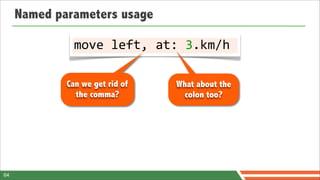
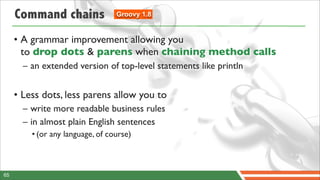
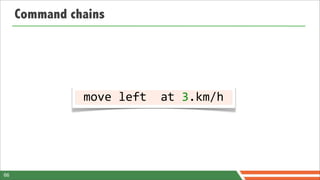
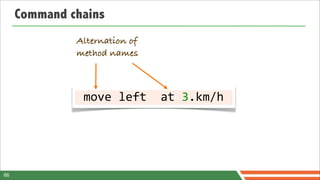
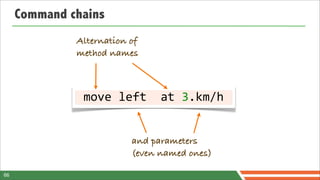
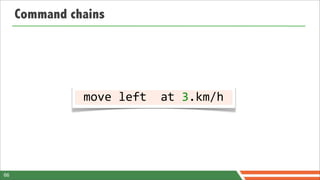
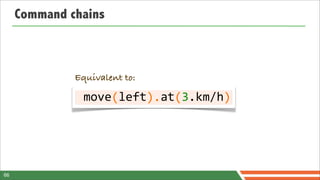

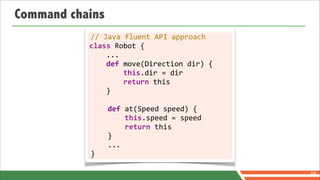
![Command chains
def
move(Direction
dir)
{
[at:
{
Speed
speed
-‐>
...
}]
}
69](https://image.slidesharecdn.com/groovydsls-springone2gx2012-121016222638-phpapp02/85/Groovy-Domain-Specific-Languages-SpringOne2GX-2012-126-320.jpg)
![Command chains
def
move(Direction
dir)
{
[at:
{
Speed
speed
-‐>
Nested maps
... and closures
}]
}
69](https://image.slidesharecdn.com/groovydsls-springone2gx2012-121016222638-phpapp02/85/Groovy-Domain-Specific-Languages-SpringOne2GX-2012-127-320.jpg)
![Command chains
def
move(Direction
dir)
{
[at:
{
Speed
speed
-‐>
Nested maps
... and closures
}]
}
Usage in
your DSLs
move
left
at
3.km/h
69](https://image.slidesharecdn.com/groovydsls-springone2gx2012-121016222638-phpapp02/85/Groovy-Domain-Specific-Languages-SpringOne2GX-2012-128-320.jpg)

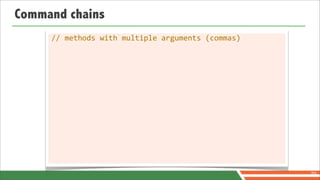
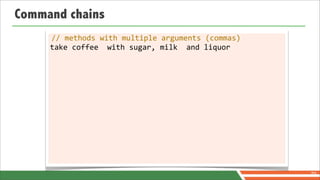
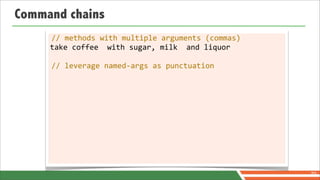
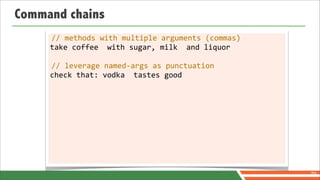
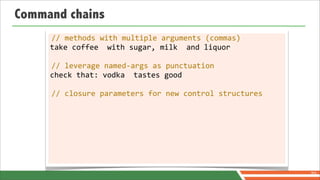
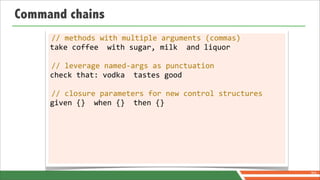
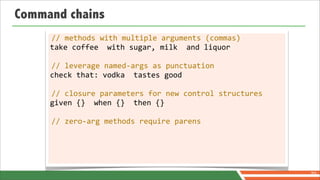
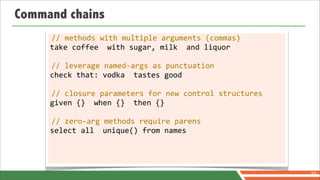
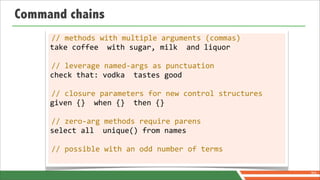
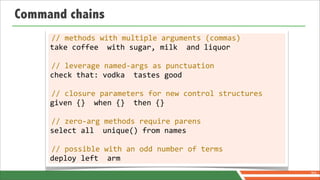
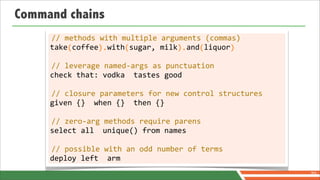
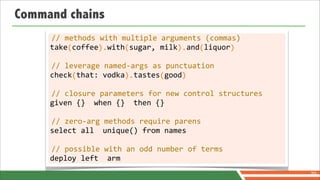
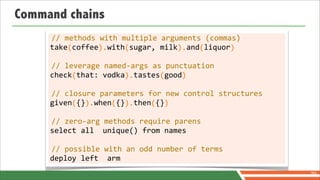
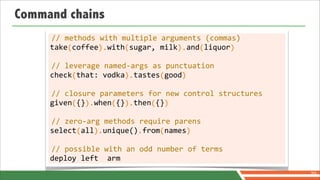
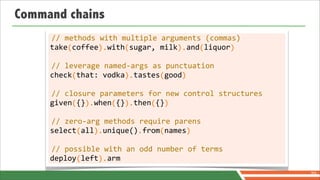

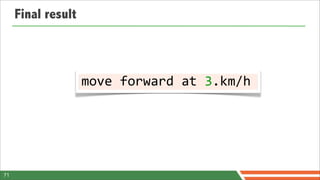





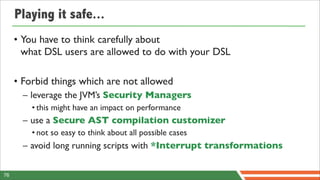
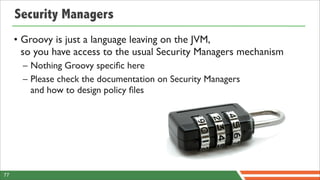
![SecureASTCustomizer
def
secure
=
new
SecureASTCustomizer()
secure.with
{
//
disallow
closure
creation
closuresAllowed
=
false
//
disallow
method
definitions
methodDefinitionAllowed
=
false
//
empty
white
list
=>
forbid
certain
imports
importsWhitelist
=
[...]
staticImportsWhitelist
=
[...]
//
only
allow
some
static
import
staticStarImportsWhitelist
=
[...]
//
language
tokens
allowed
tokensWhitelist
=
[...]
//
types
allowed
to
be
used
constantTypesClassesWhiteList
=
[...]
//
classes
who
are
allowed
to
be
receivers
of
method
calls
receiversClassesWhiteList
=
[...]
}
def
config
=
new
CompilerConfiguration()
config.addCompilationCustomizers(secure)
def
shell
=
new
GroovyShell(config)
78](https://image.slidesharecdn.com/groovydsls-springone2gx2012-121016222638-phpapp02/85/Groovy-Domain-Specific-Languages-SpringOne2GX-2012-154-320.jpg)
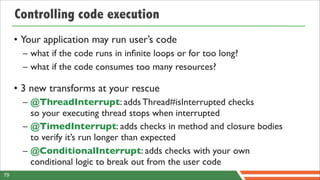
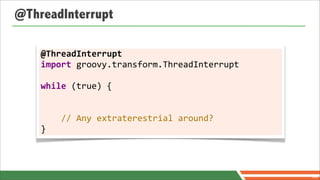
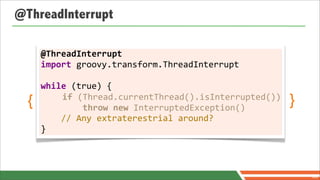
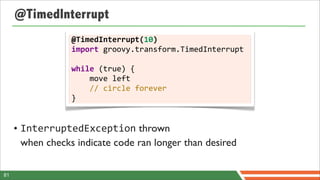
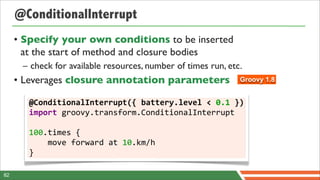
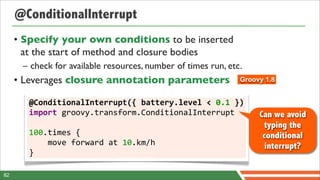
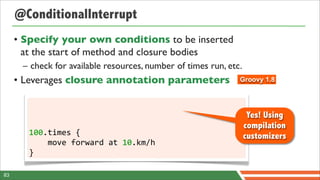
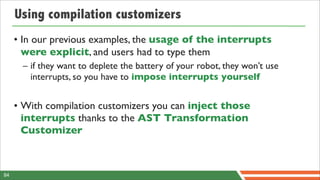



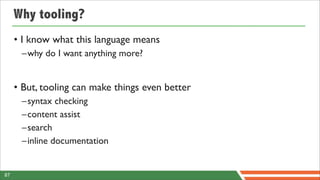
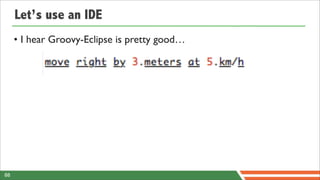
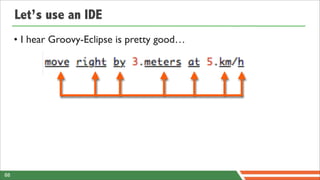
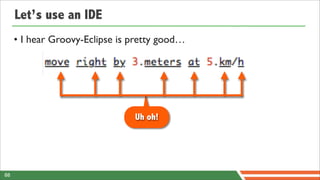
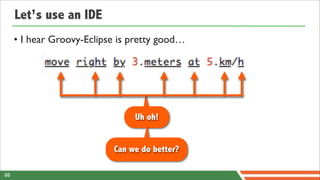
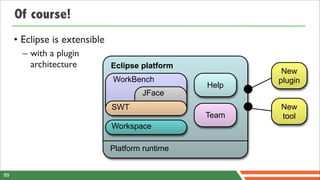

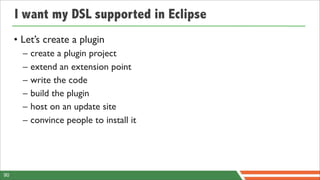
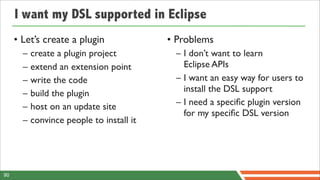
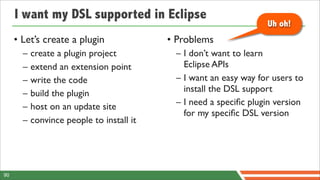
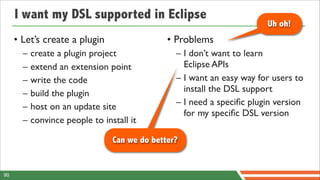
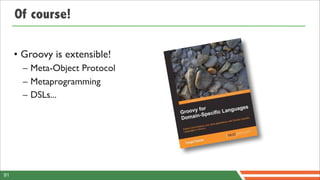
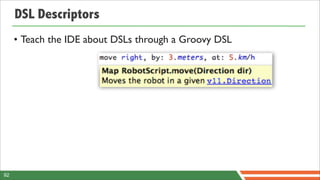
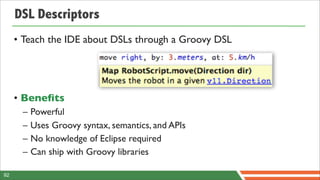
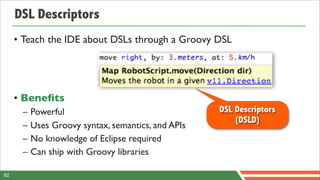
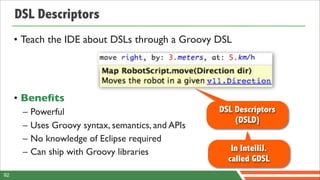
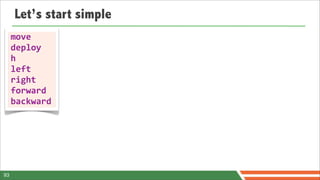
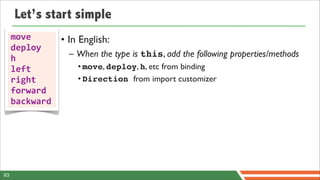
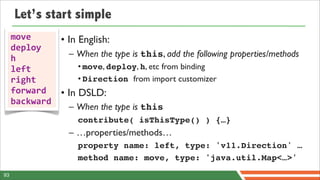
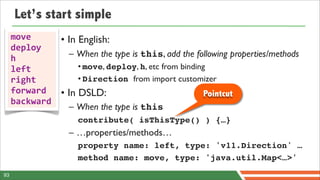
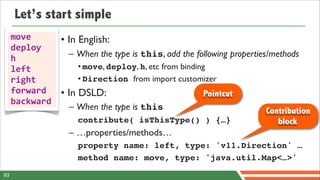

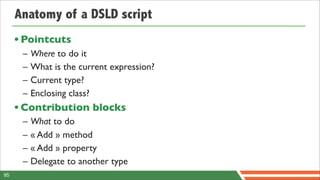
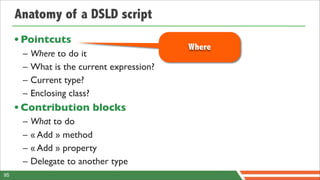
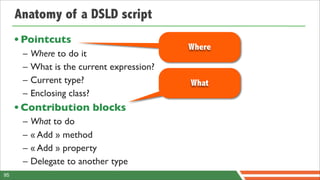
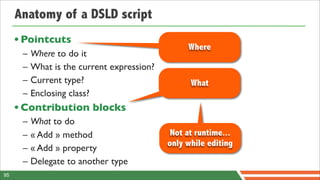
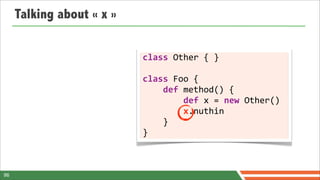
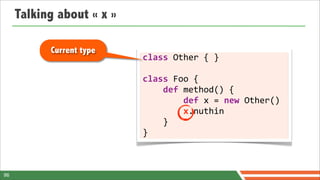
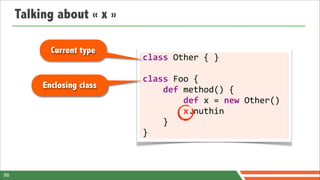
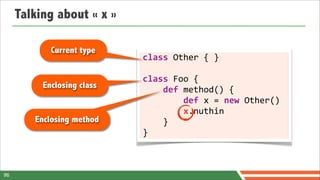

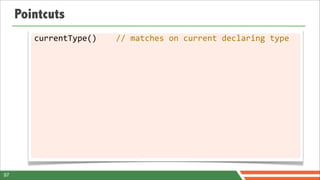
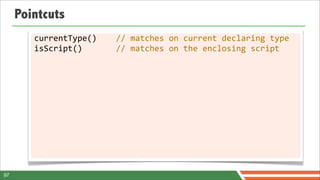
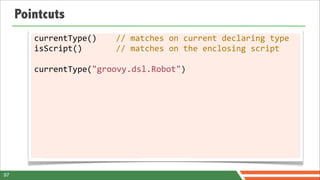
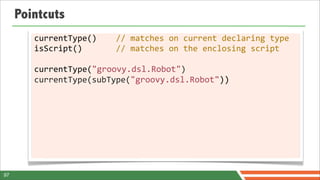
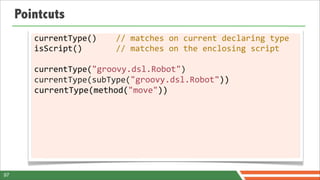
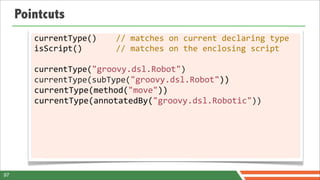
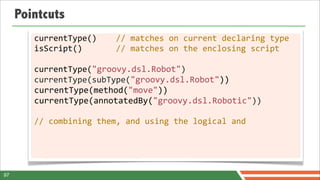
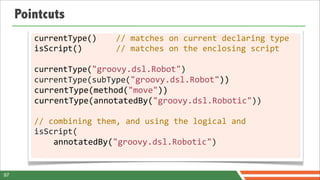
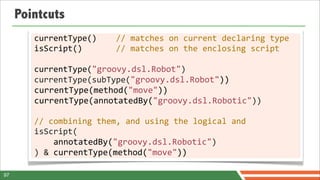

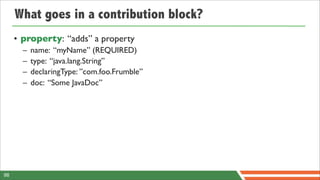
![What goes in a contribution block?
• property: “adds” a property
– name: “myName” (REQUIRED)
– type: “java.lang.String”
– declaringType: ”com.foo.Frumble”
– doc: “Some JavaDoc”
• method: “adds” a method
– all arguments above, and
– params: [ firstName: “java.lang.String”, lastName: “java.lang.String” ]
– namedParams, optionalParams
98](https://image.slidesharecdn.com/groovydsls-springone2gx2012-121016222638-phpapp02/85/Groovy-Domain-Specific-Languages-SpringOne2GX-2012-208-320.jpg)
![What goes in a contribution block?
• property: “adds” a property
– name: “myName” (REQUIRED)
– type: “java.lang.String”
– declaringType: ”com.foo.Frumble”
– doc: “Some JavaDoc”
• method: “adds” a method
– all arguments above, and
– params: [ firstName: “java.lang.String”, lastName: “java.lang.String” ]
– namedParams, optionalParams
• delegatesTo: “delegates” invocations to another type
– type (REQUIRED)
98](https://image.slidesharecdn.com/groovydsls-springone2gx2012-121016222638-phpapp02/85/Groovy-Domain-Specific-Languages-SpringOne2GX-2012-209-320.jpg)
![What goes in a contribution block?
• property: “adds” a property contribute(...)
{
– name: “myName” (REQUIRED)
property
name:
"myName"
– type: “java.lang.String”
method
name:
"getMyName"
– declaringType: ”com.foo.Frumble”
delegatesTo
type:
– doc: “Some JavaDoc”
"some.other.Type"
• method: “adds” a method }
– all arguments above, and
– params: [ firstName: “java.lang.String”, lastName: “java.lang.String” ]
– namedParams, optionalParams
• delegatesTo: “delegates” invocations to another type
– type (REQUIRED)
98](https://image.slidesharecdn.com/groovydsls-springone2gx2012-121016222638-phpapp02/85/Groovy-Domain-Specific-Languages-SpringOne2GX-2012-210-320.jpg)

